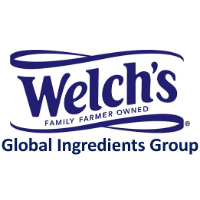The Welch’s Concord grape juice brand is world-renowned and has been a staple of breakfast tables in millions of American households for more than a century. Now, in an exciting new diversification, Welch’s ingredients division has commercially launched a new de-characterized grape juice ingredient for New York State winemakers.

An initial partnership between Welch’s Global Ingredients Group, the New York Wine & Grape Foundation and Cornell University’s Department of Food Science led Welch’s to develop a proprietary technology that neutralizes the aroma and flavor of Welch’s signature Concord grape juice. The neutralized juice can be used as a base wine or blender and, across a wide variety of wine styles, provides a new option for New York wineries wishing to reduce costs without sacrificing quality.
Concord grapes are typically 40-50% less expensive than other neutral/base wine varieties and, with year-round availability, they offer a high quality and cost-effective option even well after harvest. Some winemakers have already produced dry red blends using 10-20% de-characterized Concord as their base. The juice is also a great solution in Sangrias, blackberry wine, and other fruit-forward wines.
The launch of de-characterized juice has come as part of a drive to boost New York’s Concord grape industry and, in turn, the local economy. These efforts have received backing from Governor Andrew Cuomo who, in 2018, hosted a New York State Concord Grape Summit to announce the funding of a series of advanced research programs, one of which was the Cornell University project.
Sam Filler, Executive Director of the New York Wine & Grape Foundation, says: “Several years ago the Concord market suffered from diminishing market demand and there was an opportunity to develop new uses especially for the wine market. New York Wine & Grape Foundation stepped in to provide seed funding to support denaturing research at Cornell University. We are excited that this research has led to a new de-characterized Concord product. This is another positive outcome from Governor Cuomo’s Concord grape summit.”
One early adopter of Welch’s de-characterized Concord grape juice is Phil Plummer, the winemaker at Montezuma Winery in Seneca Falls, NY, who has already used it to add weight and texture to a batch of sweet and semi-sweet red wine blends. He has been impressed with the results and is building Welch’s de-characterized Concord grape juice into production planning for the winery’s coming vintage.
“When we got the juice, I really wanted to put the de-characterization claims to the test,” explains Phil. “Our fermentation strategy was basically just to treat it like we would any other Concord juice, following the same protocol of yeast strain selection, temperature control, and other fermentation management parameters. The idea here was to keep the wine pretty straightforward so we could get a really clear look at how much – if any – foxiness would be left in wines from juice subjected to the de-characterization treatment. Following fermentation and stabilization, the difference in aromatic profile between wines made from untreated versus de-characterized Concord juice is profound.”
With more than 50 million gallons of bulk storage, Welch’s has facilities in New York State (as well as in Washington, Michigan and Pennsylvania) offering New York’s winemakers an opportunity to save on both storage and freight while taking advantage of Welch’s operational efficiencies. Welch’s grape juices for wine are all made from grapes grown on family-owned farms across the USA, including New York, which is a bonus for winemakers in the State who might be looking to highlight regional ingredient sourcing on their labels. Organic variants are also available for the increasingly popular organic wine segment.
At his Montezuma Winery, Phil says that nearby availability of de-characterized Concord grape juice is a major plus point. “If you look at similar products from the west coast, they’re made from fairly neutral grape varieties that are priced similarly to Concord. Here in the northeast, we don’t have easy access to those varieties, and the neutral equivalents that we’re growing cost about twice as much. Using de-characterized juices to make these wines will allow us to more competitively price our finished products.”
Heading up Welch’s wine ingredient business is Zach Longhini, who describes the company’s new offering as “game-changing” for the wine industry. “As Phil’s experience attests, de-characterized Concord grape juice presents a genuinely new raw material sourcing option for wineries located far from the west coast. We think many more New York wineries could benefit in the same way and we’re excited by this roll-out.”
Zach believes that the culture and heritage of Welch’s is a perfect fit for New York’s wineries. “We’ve been making grape juice for 150 years and we understand the importance of quality and consistency,” he says. “No one harvests more Concord and Niagara grapes than we do. But we’re not a big corporation – we’re a cooperative of over 700 family farmers, many of whom are fourth and fifth generation. This helps us maintain a personal touch and create long-term relationships with winemakers like Phil.”
Phil says that reducing costs is a major advantage of de-characterized Concord grape juice, but he adds: “After getting a chance to work with them in the winery, I see so much more potential for them. There’s a surprising amount of phenolic texture to the wine we produced from this juice, and I think that might make it even more versatile.”
He continues: “In cooler climates like ours, there are years where we struggle to accumulate the desired amount of sugar and/or developed tannins in our grapes before we harvest them. These are deficiencies that we can address in the winery to some degree. But I see de-characterized Concord – particularly in concentrate form – being something we could sprinkle into fermentations where we’re looking for a bit more alcohol, structure and color than we’d get if we fermented the fruit without. I really need to keep experimenting with these juices and applying different fermentation parameters to see what the ceiling is, but I’m excited to continue on that process.”
If you are interested in learning more about Welch’s products for winemaking or would like to receive samples please contact Zach Longhini at zlonghini@welchs.com or 978-371-3779.

